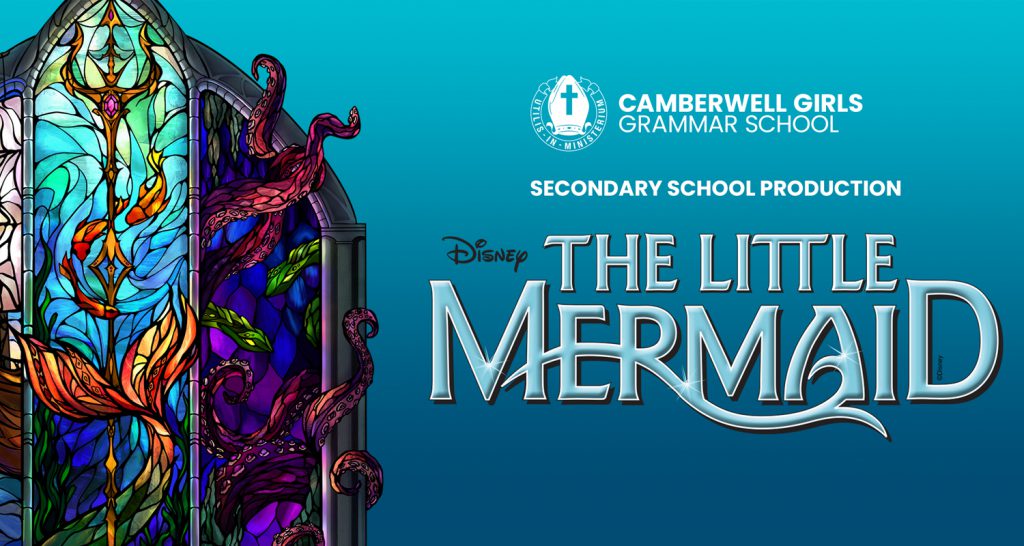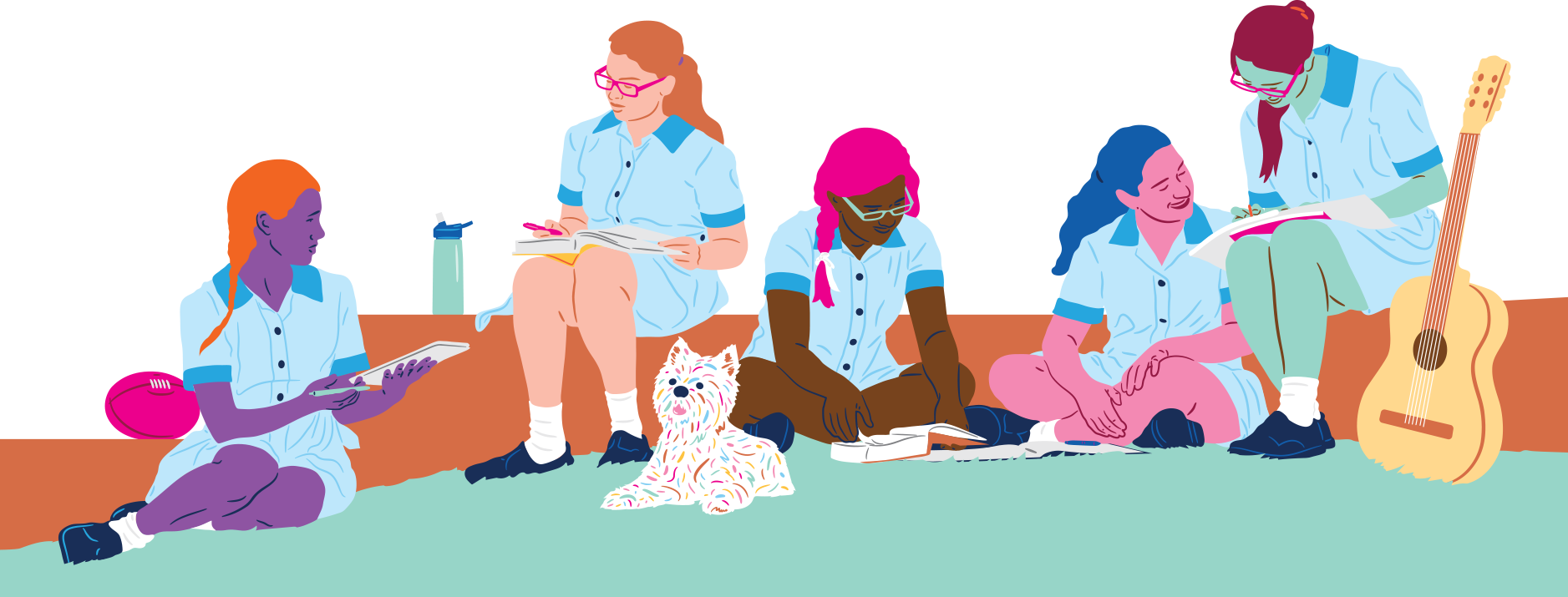From award-winning performances and work experience reflections to immersive excursions and innovative STEM challenges, our secondary students embraced every opportunity this term.

Dear Parents and Guardians,
Camberwell Girls school productions engage many students, not just those performing on stage. For example, students who have gained certification in operating our sound and lighting equipment help design the outputs and operate equipment during the performances. Teams of students also work in the MakerSpace for months, designing and building props and assisting with costuming needs, whilst others design the artwork to promote the production.
This year our School Drama Captain, Helena M, oversaw the rolling out of the ‘Little Mermaid Design Competition’ for students to enter their artwork for consideration to promote the production. There were two designs that captured the interest of the judges. Charlotte P (Year 10) and Laura T (Year 12) entered different, but complementary designs and were asked if they would like to collaborate on a final piece. The result is inspiring and is the artwork that you can see below. Congratulations to both Charlotte and Laura!

Please click the button below to view a short video of their process. I also encourage you to book tickets, as they are selling quickly for performances on 31 July (Matinee) and 1-3 August (evening performances). This production is suitable for all ages, and seats for the performances will undoubtedly be in demand!
Victoria’s new reading policy
Last week the Victorian Education Minister, Ben Carroll announced mandated changes for Victorian Government Schools around teaching Literacy in the Primary years. Camberwell Girls has been a strong advocate of this evidence informed approach and after a significant review cycle in 2018, cemented this approach in our Junior School (JS).
Our Director of Learning Design and Development, Dr Charlotte Forwood led this review and change with our JS Leadership team and has written a piece (see below) to provide more detail for you. Our commitment to providing high quality learning experiences for our students continues to be reinforced by education leaders and researchers.
With best wishes,
Debbie Dunwoody
Principal
One of the good news stories today was the announcement by Victorian Education Minister, Ben Carroll of a system wide policy shift for Victorian Government Schools, with schools being mandated to teach literacy using a structured, evidence informed approach. This will include minimum requirements for students in Foundation to Year 2 to access explicit teaching of phonics and phonemic awareness, two of the five essential components of reading, the other three being vocabulary, fluency and comprehension. These five components are underpinned by oral language which is foundational to reading development. Currently, schools can choose how students are taught to read, leaving many students at risk of becoming instructional casualties.
This welcome change in policy has been a long time in coming. A wave of schools with committed leadership, and many dedicated long term advocates including Jordana Hunter from the Grattan Institute, Jennifer Buckingham, Director of the Five from Five Project, Professor Pamela Snow and Professor Tanya Serry co-founders of the SOLAR Lab at La Trobe University have ensured the narrative around best practice in literacy has been consistent and persistent.
Monitoring of the implementation of the policy shift will be essential to ensure fidelity of instruction, as up until now Victorian Schools have been “choosing their own adventure in reading instruction” according to Professor Pamela Snow (Grace, 2024).
We need to ensure there is relevant and timely teacher professional development, access to aligned resources and clear communication with stakeholders. It takes time to implement change in pedagogical practice. At Camberwell Girls Grammar School, our explicit literacy instruction journey began in 2018 with professional learning focusing on creating a shared understanding of the reading research and evidence-based practices, developing a common language and supporting teacher skill building. It has taken time to increase our knowledge, understanding and skills, and to effectively resource our classrooms but we are well advanced in this area.
Our 2019 Foundation students were the first to benefit from the heavy lifting of our teachers. When these students completed their Year 3 NAPLAN assessments in 2022, 95% of the cohort were in the top two bands for reading and 100% in the top two bands for writing. A high percentage of these students have an English as an Additional Language (EAL) background. Triangulation of school-based monitoring data also supports this growth in literacy skills.
From 2019 Camberwell Girls was fortunate to be part of the joint ISV and Project Zero at Harvard Graduate School of Education’s Idea Into Action Project, led by Professor David Perkins and Dr Flossie Chua. This project explored the use of tools to support implementation and sustainability of complex change. The toolkit will be released as a free resource in 2024. For us, involvement in the project aligned with our aim to change our literacy instructional practices.
Change is not easy. Not being able to read or write well has significant implications for students, not only in terms of their academic trajectory, but also their self-efficacy, wellbeing and economic prospects beyond school. Each student deserves to be given the opportunity to learn how to read and in turn, read to learn. In the future, I hope that reading success will no longer depend on the school a student attends, or the teacher they have in Foundation or Year 1. Thank you to the educators, families, researchers and journalists who continue to work tireless to effect change for all our students, especially the most vulnerable.
Reference:
Grace, R. (2024, June 12). The way children are taught to read in Victoria is about to change. The Age. https://www.theage.com.au/national/victoria/the-way-children-are-taught-to-read-in-victoria-is-about-to-change-20240607-p5jk7u.html
From award-winning performances and work experience reflections to immersive excursions and innovative STEM challenges, our secondary students embraced every opportunity this term.
Curiosity, creativity and care have shaped Term 2 at the Junior School with highlights including student-led sustainability initiatives, national debating success and inspiring community connections.
Celebrating 105 years, rallying behind fundraising efforts, and supporting student growth – ended by showcasing the strength and spirit of our Camberwell Girls community.
This edition, Mrs Dunwoody reflects on a term filled with learning, leadership, and community connection, including milestone events and exciting student initiatives.
We acknowledge and pay respect to the Wurundjeri people as the traditional custodians of the land on which the school is situated.
Secondary School / Administration
2 Torrington Street, Canterbury
Victoria 3126 Australia
T +61 3 9813 1166
F +61 3 9882 9248
camgram@cggs.vic.edu.au
Junior School / Ormiston

